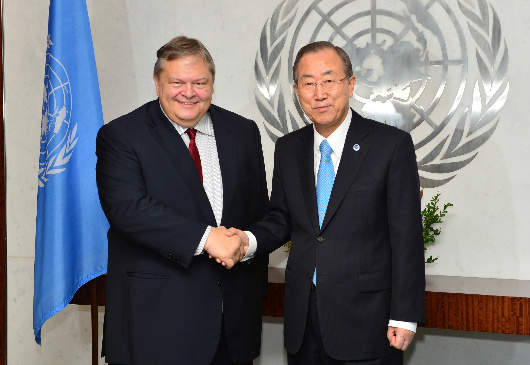 Deputy Prime Minister and Foreign Minister Evangelos Venizelos made the following statements following his meeting today with UN Secretary General Ban Ki-moon:
Deputy Prime Minister and Foreign Minister Evangelos Venizelos made the following statements following his meeting today with UN Secretary General Ban Ki-moon:
“The main subject of my meeting with the UN Secretary General was our major issues.
First of all we discussed the Skopje name issue – Mr. Nimetz participated in the UN delegation. The Secretary General is very well informed regarding our proposal. Our national position is very clear. It is supported by a broad range of political forces in Greece. We are in favor of a mutually acceptable compound name with a geographical qualifier – but a name that will be for all uses, erga omnes. A definitive, clear, functional solution. In this way, our neighbouring country, too, will be able to find its European perspective, and this is very important for both them and us, because we want the whole of the Western Balkans to find this common perspective, which functions as a stabilizing factor in our region. We will offer all other possible assistance. We are the major investor, the big neighbour who can help with a sense of friendship, provided, of course, there is good faith, good neighbourliness and respect for international law.
On the Cyprus issue, Greece, of course, always supports the efforts of the UN Secretary General. Now we have fresh momentum, because we have very specific proposals from the President of the Republic of Cyprus, Mr. Anastasiades. We have a comprehensive proposal for confidence-building measures with regard to Famagusta, centered on Famagusta, the occupied city and the port and the wider area, which can give new ideas and new momentum. We have the appointment of negotiators from the two communities, which is very important. And of course is very important for us to have the European Union present, because any solution must bear in mind the Community acquis and be acceptable to the Cypriot people in a referendum. Because this is the only way for a solution to be legitimized and viable.
We naturally talked about other issues, as well. The future of the UN and Greece’s contribution to the UN’s procedures and actions. Regarding the major problem of Syria, Greece is in the main European current. We are pursuing a political solution through a Geneva 2-type process. We unequivocally condemn the use of chemical weapons, and a framework has now been shaped – following the Kerry-Lavrov agreement – that is very important, because it enables the Security Council to play its role, not just in Syria, but on every international issue. Because the Security Council is what lends meaning and perspective to the institution of the United Nations. Of course, there is also the humanitarian dimension, which is very important. I am among the 28 Foreign Ministers who signed the joint article that sets the humanitarian dimension at the epicentre, because we forget that everyday people are being killed, wounded, persecuted in Syria: elderly people, women, children. It is very important for us to remember this.”
JOURNALIST: Mr. Minister, on the Cyprus issue, the UN has set a timeframe for the opening of talks in October. On the other hand, President Anastasiades is stressing the issue of good preparation – and if the preparation hasn’t been completed by October, let the opening come later. Did you discuss this with the Secretary General?
E. VENIZELOS: October was in fact stated as a goal, and I would like to hope that the preparations will be carried out in the best manner. Mr. Downer’s meetings with the negotiators from both communities have already begun, and I would like to hope that through all of these processes, we will see the shaping of a new framework that will impart momentum; that is, allow us to see the real horizon of a solution – but a solution that will have to have the characteristics we set out earlier.
JOURNALIST: Did you talk to the Secretary General about the delimitation of maritime zones? What does today’s trilateral meeting (Greece, Cyprus, Egypt) mean for Greek diplomacy?
E. VENIZELOS: The UN is not involved in the maritime zone issue except as the repository of the International Convention on the Law of the Sea, and we have proceeded to the necessary Verbal Notes on all the issues that we consider necessary. At the appropriate time. We have proceeded to all the verbal notes to the UN.
JOURNALIST: Will today’s trilateral meeting speed up development on the matter of delimitation?
E. VENIZELOS: This is a development that does not concern the Secretary General. My meeting today with my colleagues the Foreign Ministers of Egypt and Cyprus is very important. You can see that following my 5 September visit to Cairo, within a few days, within 15 days, we are having a tangible follow-up. Of course, we also have bilateral consultations, on a technical level, between Greece and Egypt, on the delimitation of maritime zones in the Eastern Mediterranean.
JOURNALIST: Is today’s trilateral meeting a message to Turkey?
E. VENIZELOS: Today’s trilateral meeting sends no message to any specific country. We are not turning against any country – we are moving in favor of peace, security and stability in the Mediterranean. We are also participating in other trilateral collaborations and initiatives. It is very important for there to be balances, for all the countries that can to move to contribute in one direction: the direction of international law and capitalization on the resources of the Mediterranean, to the benefit of all peoples, but always within the framework of the International Law of the Sea.
September 22, 2013


